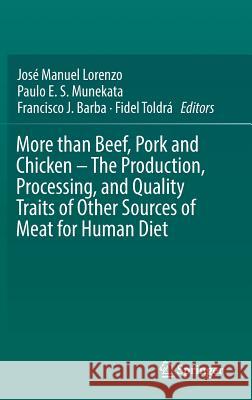More Than Beef, Pork and Chicken - The Production, Processing, and Quality Traits of Other Sources of Meat for Human Diet » książka
topmenu
More Than Beef, Pork and Chicken - The Production, Processing, and Quality Traits of Other Sources of Meat for Human Diet
ISBN-13: 9783030054830 / Angielski / Twarda / 2019 / 416 str.
More Than Beef, Pork and Chicken - The Production, Processing, and Quality Traits of Other Sources of Meat for Human Diet
ISBN-13: 9783030054830 / Angielski / Twarda / 2019 / 416 str.
cena 401,58
(netto: 382,46 VAT: 5%)
Najniższa cena z 30 dni: 385,52
(netto: 382,46 VAT: 5%)
Najniższa cena z 30 dni: 385,52
Termin realizacji zamówienia:
ok. 22 dni roboczych.
ok. 22 dni roboczych.
Darmowa dostawa!
Kategorie:
Kategorie BISAC:
Wydawca:
Springer
Język:
Angielski
ISBN-13:
9783030054830
Rok wydania:
2019
Wydanie:
2019
Ilość stron:
416
Waga:
0.77 kg
Wymiary:
23.39 x 15.6 x 2.39
Oprawa:
Twarda
Wolumenów:
01
Dodatkowe informacje:
Wydanie ilustrowane











